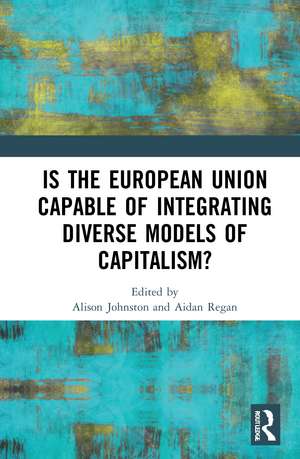Is the European Union Capable of Integrating Diverse Models of Capitalism?
Editat de Alison Johnston, Aidan Reganen Limba Engleză Hardback – 31 mar 2021
This volume adds a comparative capitalism perspective to EU integration scholarship in order to demonstrate that ever-closer union is not capable of accommodating diversity in national economic institutions. Chapters in this volume provide an innovative framework for understanding what factors related to European integration impede the economic and political integration of diverse European market economies. While recent comparative capitalism literature highlights that European monetary integration has favored export-led growth regimes, contributions in this volume outline that the EU’s prioritization of export-led growth over domestic-demand led growth is present in other facets of integration, including EU accession, financial integration, the free movement of people, fiscal governance and the Europe 2020 growth strategy.
The chapters in this book were originally published as a special issue of New Political Economy.
| Toate formatele și edițiile | Preț | Express |
|---|---|---|
| Paperback (1) | 259.98 lei 43-57 zile | |
| Taylor & Francis – 25 sep 2023 | 259.98 lei 43-57 zile | |
| Hardback (1) | 762.57 lei 43-57 zile | |
| Taylor & Francis – 31 mar 2021 | 762.57 lei 43-57 zile |
Preț: 762.57 lei
Preț vechi: 1026.47 lei
-26% Nou
Puncte Express: 1144
Preț estimativ în valută:
145.96€ • 158.60$ • 122.69£
145.96€ • 158.60$ • 122.69£
Carte tipărită la comandă
Livrare economică 21 aprilie-05 mai
Preluare comenzi: 021 569.72.76
Specificații
ISBN-13: 9780367745493
ISBN-10: 0367745496
Pagini: 122
Dimensiuni: 174 x 246 mm
Greutate: 0.36 kg
Ediția:1
Editura: Taylor & Francis
Colecția Routledge
Locul publicării:Oxford, United Kingdom
ISBN-10: 0367745496
Pagini: 122
Dimensiuni: 174 x 246 mm
Greutate: 0.36 kg
Ediția:1
Editura: Taylor & Francis
Colecția Routledge
Locul publicării:Oxford, United Kingdom
Public țintă
Postgraduate and UndergraduateCuprins
Introduction: Is the European Union Capable of Integrating Diverse Models Of Capitalism?
Alison Johnston and Aidan Regan
1. Better Than the Euro? The European Monetary System (1979–1998)
Martin Höpner and Alexander Spielau
2. Exporting Assets: EMU and the Financial Drivers of European Macroeconomic Imbalances
Gregory W. Fuller
3. The Political Economy of Austerity in Southern Europe
Sofia A. Perez and Manos Matsaganis
4. Skill Formation, Immigration and European Integration: The Politics of the UK Growth Model
Steve Coulter
5. Celtic Phoenix or Leprechaun Economics? The Politics of an FDI-led Growth Model in Europe
Aidan Regan and Sam Brazys
6. European Integration, Capitalist Diversity and Crises Trajectories on Europe’s Eastern Periphery
Dorothee Bohle
Alison Johnston and Aidan Regan
1. Better Than the Euro? The European Monetary System (1979–1998)
Martin Höpner and Alexander Spielau
2. Exporting Assets: EMU and the Financial Drivers of European Macroeconomic Imbalances
Gregory W. Fuller
3. The Political Economy of Austerity in Southern Europe
Sofia A. Perez and Manos Matsaganis
4. Skill Formation, Immigration and European Integration: The Politics of the UK Growth Model
Steve Coulter
5. Celtic Phoenix or Leprechaun Economics? The Politics of an FDI-led Growth Model in Europe
Aidan Regan and Sam Brazys
6. European Integration, Capitalist Diversity and Crises Trajectories on Europe’s Eastern Periphery
Dorothee Bohle
Notă biografică
Alison Johnston is Associate Professor and the U.G. Dubach Chair in Political Science in the School of Public Policy at Oregon State University, Corvallis, USA.
Aidan Regan is Associate Professor in the School of Politics and International Relations at University College Dublin, Ireland, and the director of the Dublin European Institute.
Aidan Regan is Associate Professor in the School of Politics and International Relations at University College Dublin, Ireland, and the director of the Dublin European Institute.
Descriere
This volume adds a comparative capitalism perspective to EU integration scholarship in order to demonstrate that ever-closer union is not capable of accommodating diversity in national economic institutions.
